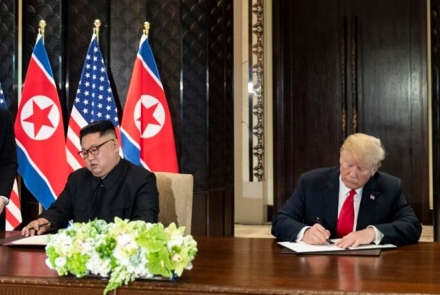
Photo by The White House from Washington, DC on Wikimedia Commons
COVID-19, North Korea, nuclear weapons and the Indo-Pacific
By Mike Cohen, National Security College, Crawford School
The COVID-19 pandemic has now taken over half a million lives and will surely be considered as one of the most dangerous global challenges of the twenty-first century. One potential upside, however, is that it seems to have turned President Trump and North Korean leader Kim Jong Un’s attention away from each other and toward managing what for both leaders is a very serious set of challenges that may threaten their political survival. Indeed, Kim’s recent long absence from public view may have been pandemic driven self-isolation. With the number of pandemic related fatalities in the United States approaching one hundred and fifty thousand – with about one if four worldwide pandemic related fatalities based in the United States – the President can hardly afford to begin a new round of diplomacy with North Korea.
Any predictions regarding North Korea and nuclear weapon related foreign policy must always carry large error terms, but Kim, like his predecessors, is surely playing as long a game as his health will allow. Barring any medical and/or COVID-19 issues, he knows that he will outlast Trump and presumably several of his successors. Kim went to the more abortive Hanoi summit knowing that whatever happened there, he would have another two years of Trump’s first term to wrestle concessions from the President and further engage if he so chose. It therefore seems to me that he would be unlikely to risk any diplomatic forays with the U.S. President now when Trump may well have left the building by January 2021. Whatever ability President Trump had to credibly commit to concessions to North Korea has likely now evaporated. Much better for Kim to wait 8 months until Trump or his successor has another 4 years and then begin this round of engagement with the United States with a test of what may be a mobile solid fuel ICBM that can more credibly deliver nuclear payloads to the continental United States. North Korea’s more recent destruction of the inter-Korean liason office and threats to intensify the propaganda war through ballooning anti-South Korea leaflets across the border suggest a couple of dangerous developments. First, Kim wants to signal that any rapprochement with South Korea has not delivered enough for North Korea, has reached its zenith and that revitalising North-South diplomacy and engagement is not North Korea’s desired way forward. Second, this reminds us that a large part of North Korea’s foreign relations focus is on the United States and that whoever wins the 2020 U.S. Presidential election will likely begin their term with an explosive gift from North Korea.
One way that this prediction may be wrong – and that the pandemic may provoke North Korean violence before the end of 2020 – is if Kim believes that a Biden administration will likely be in office in 2021 and be less favourable to North Korea than Trump was. The North Korean leader may attempt to engineer a crisis close enough to the election to keep Trump in power but avoid escalation. Such a move would carry high escalatory potential and be very dangerous. Of course Trump may feel pressure to escalate to such a provocation in a manner that he hasn’t before, and such a crisis may reduce Trumps chances at the general election through convincing the electorate that he is too trigger happy. Perhaps at least as dangerous and likely is Trump attempting to engineer a breakthrough or more likely a crisis with North Korea to rally the nation around him and win the election. Such a move however may also be more likely to cause nuclear escalation and increase the chance that Biden will be President in 2021.
I think however that because of the COVID-19 pandemic these election related crisis manipulations are less likely because Kim and Trump have more pressing domestic fish to fry. The pandemic may have effectively helped kick the North Korean nuclear problem down the road to the next President. It’s far from clear that a second Trump or first Biden term could make new progress on the North Korean nuclear issue where so many have failed. But half a year of stability or at least the absence of twitter threat storms, nuclear weapon and long range missile tests and poorly planned summitry involving the United States and North Korea is something we should be thankful for. North Korea’s nuclear journey has not been kind to already under pressure Indo-Pacific geopolitical stability and nuclear non-proliferation dynamics. Aided and abetted by an inconsistent and fundamentally transactionalist Trump administration that will be preoccupied with domestic affairs for the remainder of 2020, South Korean and Japanese foreign policy-makers will surely, if they haven’t already, revisit the cost/benefit side of the nuclear weapon development ledger. The demise of any hope of North-South rapprochement would increase the benefits more than the costs, and the record of President Trumps first term will instill little confidence that a second Trump term will provide security for Seoul and Tokyo against a nuclear North Korea. The COVID-19 pandemic may force whoever wins the 2020 U.S. Presidential election to be so preoccupied with the economic and health related tasks of recovering from it that not only North Korean but maybe also South Korean nuclear weapon developments slip through the radar, only to be announced with one or more bangs once its too late.
This is a revised version of an article published at The National Interest in May 2020.
Updated: 17 July 2024/Responsible Officer: Crawford Engagement/Page Contact: CAP Web Team












